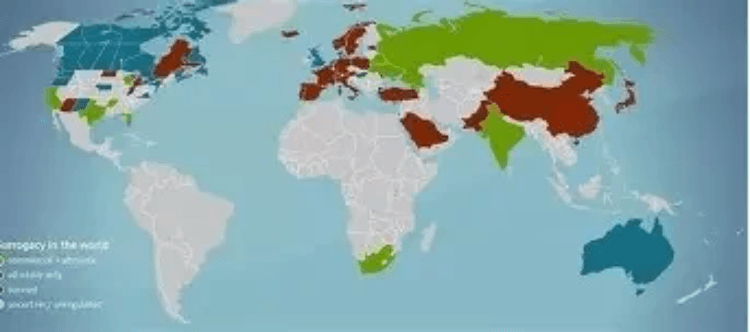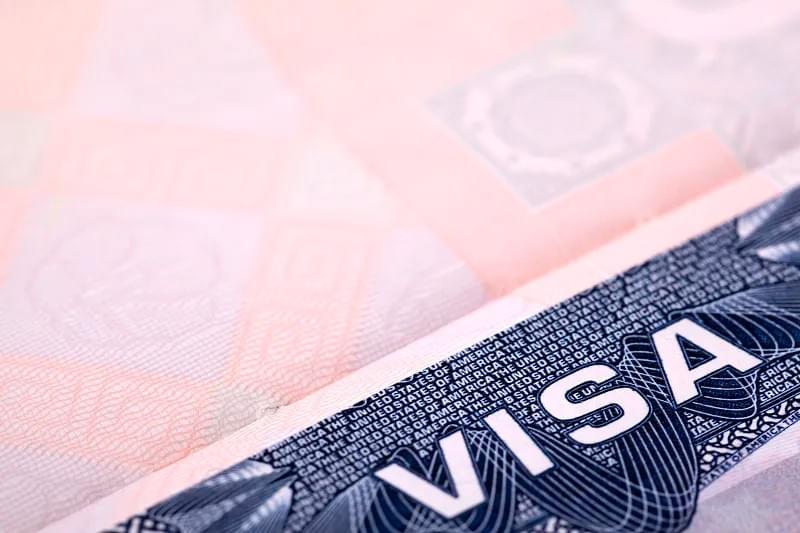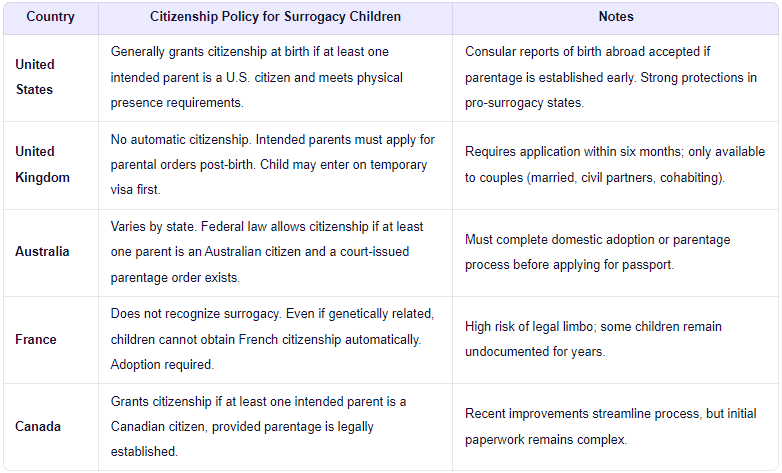
In recent years, assisted reproductive technologies (ART) have revolutionized family-building options for individuals and couples facing infertility, same-sex partners, and single parents by choice. Among these advancements, surrogacy has emerged as a viable path to parenthood for many. However, while the medical and emotional aspects of surrogacy are widely discussed, one critical issue remains underexplored yet profoundly impactful: citizenship challenges faced by children born through international surrogacy arrangements.
As more intended parents turn to cross-border surrogacy due to restrictive domestic laws or lack of access, they often encounter unforeseen legal hurdles—particularly when it comes to securing nationality and citizenship for their newborns. These challenges can result in statelessness, prolonged separation from parents, visa complications, and even denial of entry into the intended parents’ home country. This article delves into the complexities surrounding citizenship acquisition for surrogacy-born children, examines key case studies, explores jurisdictional conflicts, and offers practical guidance for prospective parents navigating this intricate landscape.
The Rise of Cross-Border Surrogacy
Surrogacy involves an agreement where a woman (the surrogate) carries and gives birth to a child on behalf of another individual or couple (the intended parents). There are two main types: gestational surrogacy, where the embryo is created using the genetic material of the intended parents or donors and implanted into the surrogate, and traditional surrogacy, where the surrogate’s own egg is used.
Due to varying legal frameworks across nations, many intended parents seek surrogacy services abroad. Countries such as India, Thailand, Ukraine, Georgia, Mexico, and certain U.S. states like California have become popular destinations due to favorable legal environments, lower costs, or advanced fertility clinics.
However, what begins as a hopeful journey toward parenthood can quickly become entangled in bureaucratic red tape when questions arise about the child's citizenship status at birth.
Why Citizenship Matters: Legal Identity and Rights
Citizenship is not merely a passport—it is the foundation of a person’s legal identity. It grants fundamental rights including the right to reside in a country, access healthcare and education, inherit property, and receive consular protection abroad. For children born via surrogacy, especially in foreign jurisdictions, establishing citizenship is often complicated by conflicting laws related to parentage, genetics, gestation, and marital status.
The core problem lies in the disconnect between how different countries define “parent” and “child” under their nationality laws. While some nations prioritize genetic connection, others emphasize the legal recognition of the birth mother (i.e., the surrogate), regardless of genetic ties. This creates a dangerous gap where a child may be denied citizenship by both the country of birth and the intended parents’ home nation.
Case Studies: Real-Life Consequences of Citizenship Gaps
Case 1: The Thai Gammy Affair (2014)
One of the most publicized cases occurred in Thailand involving an Australian couple who engaged a Thai surrogate. Twins were conceived using donor eggs and the father’s sperm. Upon learning that one twin had Down syndrome (Gammy), the couple took the healthy twin back to Australia but left Gammy behind.
Thai law at the time did not recognize intended parents as legal parents; instead, the surrogate was automatically considered the legal mother. Since the intended mother was not genetically related to either child, neither could acquire Australian citizenship at birth. Although diplomatic pressure eventually allowed Gammy to gain temporary residency, the incident exposed serious flaws in international surrogacy regulation and citizenship policy.
Case 2: German Parents and Indian Surrogacy
A German couple underwent gestational surrogacy in India, where commercial surrogacy was legal until 2015. Despite having a pre-birth court order in India naming them as legal parents, German authorities refused to issue a passport because German law requires proof of biological relation or adoption—which wasn’t recognized without a formal process.
The child was left in legal limbo for months, unable to leave India, until Germany granted humanitarian travel documents after significant media attention and legal intervention.
Case 3: U.S.-Born Surrogacy Child Denied Entry to Canada
In 2019, a Canadian couple commissioned a surrogate in Nevada. Though both intended parents were Canadian citizens and genetically related to the child, Canadian immigration officials initially denied the child entry, citing unclear parentage under Canadian law. Only after extensive documentation and legal appeals was the child granted citizenship based on genetic lineage.
These cases illustrate that even developed nations with robust legal systems struggle to accommodate the realities of modern reproductive science.

Key Factors Influencing Citizenship Determination
Several interrelated factors determine whether a surrogacy-born child will face citizenship challenges:
1. Country of Birth Laws
Nations differ significantly in how they assign citizenship:
- Jus soli (right of soil): Grants citizenship based on place of birth (e.g., USA, Canada).
- Jus sanguinis (right of blood): Grants citizenship based on parental nationality (e.g., Germany, Japan).
- Some countries use a hybrid model.
In surrogacy contexts, jus soli seems advantageous—but only if the child is legally recognized as belonging to the intended parents. If local law names the birth mother (surrogate) as the legal parent, the child may inherit her nationality, which might not align with the intended parents’ plans.
2. Genetic Link vs. Gestational Link
Some countries grant citizenship based solely on genetic relationship. Others require legal parentage established at birth, which may not reflect genetic ties. For example, if donor gametes are used and no legal mechanism transfers parentage, the child may fall through the cracks.
3. Marital Status and Sexual Orientation
Many countries still restrict surrogacy rights to heterosexual married couples. Same-sex couples or single individuals may find themselves excluded from automatic citizenship pathways, even if they are genetically related to the child.
For instance, Italy does not recognize surrogacy arrangements, and children born abroad via surrogacy are often denied Italian citizenship unless adopted—a lengthy and uncertain process.
4. Absence of International Treaties
Unlike adoption, there is no global convention governing surrogacy or harmonizing citizenship rules. The Hague Conference on Private International Law has been discussing a potential treaty since 2012, but consensus remains elusive due to ethical, cultural, and religious differences among member states.
Without standardized protocols, each country applies its own interpretation, leading to inconsistent outcomes and increased risk for families.
Common Scenarios Leading to Statelessness
While rare, statelessness among surrogacy-born children is a growing concern. According to UNHCR, a stateless person is someone "not considered as a national by any state under the operation of its law." Children born via international surrogacy can become stateless in several ways:
- The country of birth denies citizenship because the surrogate is not a national or because surrogacy contracts are invalid.
- The intended parents’ home country refuses citizenship due to lack of genetic link, absence of adoption, or non-recognition of foreign parentage orders.
- One parent is eligible to pass citizenship, but administrative delays or documentation issues prevent timely registration.
Children in this situation may lack official identity documents, making enrollment in school, travel, or accessing medical care extremely difficult.
Country-Specific Policies: A Comparative Look
Let’s examine how various countries handle citizenship for surrogacy-born children:

This patchwork of policies underscores the need for thorough pre-planning and legal counsel.

How Intended Parents Can Minimize Risks
Prospective parents considering international surrogacy must take proactive steps to safeguard their child’s citizenship rights:
1. Consult Legal Experts Early
Engage lawyers specializing in reproductive law in both the destination country and your home country before beginning treatment. Understand how parentage will be established and how citizenship will be conferred.
2. Choose Surrogacy Destinations Wisely
Opt for countries with clear legal frameworks supporting international surrogacy and mechanisms for transferring parentage. As of 2025, the U.S. (especially California), Canada (limited availability), and Greece offer relatively secure pathways.
Avoid countries that have recently banned commercial surrogacy (e.g., India, Cambodia, Nepal) unless you fully understand transitional provisions.
3. Secure Pre-Birth Parentage Orders
In jurisdictions that allow it (such as California), obtain a pre-birth judgment declaring the intended parents as legal parents. This facilitates immediate name changes on birth certificates and streamlines consulate procedures.
4. Register the Birth Promptly
Contact your embassy or consulate immediately after birth to initiate the citizenship or passport application process. Bring all necessary documents: medical records, surrogacy agreement (if enforceable), court orders, DNA tests (if required).
5. Prepare for Contingencies
Have backup plans in case citizenship is delayed. This may include securing temporary residence permits, hiring local legal representation, or arranging guardianship if travel is restricted.
6. Advocate for Policy Reform
Support organizations pushing for harmonized international standards on ART and citizenship rights. Public awareness and advocacy can drive legislative change.
The Role of Governments and International Bodies
To reduce confusion and protect children’s rights, governments and international institutions must act:
- Develop bilateral agreements recognizing surrogacy-based parentage.
- Update nationality laws to reflect advances in reproductive medicine.
- Ratify a future Hague Convention on International Surrogacy Arrangements.
- Train consular officers on handling surrogacy-related citizenship applications sensitively and efficiently.
Until then, families will continue to navigate a fragmented system where love and biology are not always enough to guarantee legal belonging.

Conclusion: Toward a More Inclusive and Predictable System
The story of surrogacy is ultimately one of hope, resilience, and the universal desire to build a family. Yet, for too many children born through international surrogacy, the beginning of life is shadowed by uncertainty over their legal identity and citizenship status.
Addressing these challenges requires coordinated efforts—from lawmakers crafting inclusive legislation to diplomats streamlining consular processes, and from fertility clinics providing transparent counseling to intended parents conducting diligent due diligence.
Every child deserves to know where they belong. By improving legal clarity, promoting international cooperation, and centering the best interests of the child, we can ensure that no surrogacy-born child is left in legal limbo simply because of how they were conceived.
For intended parents, the message is clear: plan meticulously, seek expert advice, and never assume that biology alone guarantees citizenship. With careful preparation and informed decision-making, it is possible to overcome the current challenges and welcome a new generation of surrogacy-born children into full legal membership in their families and societies.
